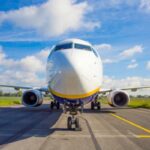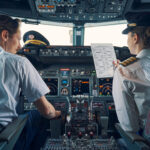Airlines are “moving in the right direction” with efforts to improve accessibility for blind and low-vision passengers, said Michael Swiatek, chief strategy officer at Abra Group, the parent company of Avianca, the largest airline in Colombia and second largest airline in Latin America, and GOL Air, the largest airline in Brazil.
Speaking to FINN, Swiatek – who is himself legally blind – said he was on a mission to uplift the lives of people with disabilities, especially those who are visually impaired, by enhancing their air travel experiences.
His unique life experiences have indelibly shaped both his outlook and career journey, but despite his disability he has achieved remarkable success in various senior-level executive roles at several prominent global airlines.
Trialling Braille in the cabin
As part of that work, the Abra Group is trialling Braille in the cabin, and other airlines, such as United, are doing the same.
Asked whether airlines were doing enough to improve accessibility, he said: “Can they move faster, should they move faster? That’s a hard question. but I’m happy to say that I think things are moving in the right direction. And that wasn’t always true for people with disabilities.”
Under Swiatek’s leadership, the Abra Group has focused on strengthening its market presence and expanding its global footprint, solidifying its position as a key player in the aviation industry.
But the company has also put accessibility for disabled passengers front and centre.
In addition to Braille seat numbering, Swiatek is advocating for this system of touch reading to be extended into the lavatory, as well as for larger, colour-differentiated fonts to be used in the cabin and for alternative options to flat, touch screens which can present challenges for blind or low-vision passengers.
As co-chair of culture transformation, diversity, equity and inclusion, and accessibility, Swiatek has committed to fostering an inclusive and progressive organisational culture that contributed to Avianca’s reputation as a socially responsible and forward-thinking airline.
Blind and low-vision community
According to World Health Organization (WHO) data, there are an estimated 285 million people in the world who are blind and have low vision, forming a substantial market segment.
There are more than a billion people, according to the WHO, who are disabled, representing the world’s largest minority.
The commercial market potential for building airlines with accessibility at their core makes market sense, and there are economic benefits to consider. Airlines compete for market share every day, and this could provide a significant competitive edge, in addition to serving more altruistic goals.

For blind and low vision people, flying can be an arduous journey, navigating a minefield of obstacles. The lack of accessible information at airports can be overwhelming.
Vital flight details, including gate changes or boarding instructions, are often presented in visual formats, posing a challenge for accessing critical information independently.
The opportunity to improve the travel experience for the countless numbers of blind and low vision people goes beyond a business venture; it becomes, instead, a moral obligation, said Swiatek.
“Embracing this opportunity with enthusiasm and a positive spirit can guide us toward a future where air travel becomes a genuinely inclusive and cherished experience for everyone,” he said.
“Together, we can soar to new heights of compassion and inclusivity, making the skies open and accessible to all, regardless of their abilities.”
Subscribe to the FINN weekly newsletter
You may also be interested in:
United adds braille to aircraft cabin interiors
London Stansted welcomes seven guide dog puppies for a training tour

